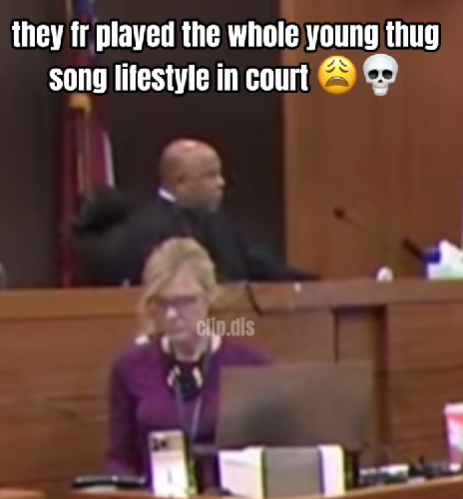In a moment that left both the courtroom and the internet stunned, prosecutors played the entire Young Thug hit song “Lifestyle” during an ongoing trial — turning what should have been a routine evidence presentation into one of the most talked-about moments in recent court history.
The bizarre scene unfolded during proceedings tied to the rapper’s highly publicized legal case. Attorneys for the prosecution reportedly used the song as part of their argument, claiming the lyrics reflected real-life criminal activity. Defense lawyers, however, immediately objected, calling the move “misleading, prejudicial, and irrelevant to the actual charges.”
According to witnesses, the courtroom went silent as the full track — nearly five minutes long — echoed through the speakers. “You could see people trying not to react,” said one observer. “Even the court reporter looked like she didn’t know whether to keep typing or just wait it out.”
Social media exploded with reactions as clips from the courtroom spread online. Fans expressed disbelief that the court would play the song in full, with one user posting, “They really turned the trial into a listening session 💀.” Another joked, “At least the judge got to hear a banger before sentencing.”
Legal analysts say the incident highlights a growing controversy in the justice system — the use of rap lyrics as evidence. Critics argue that prosecutors often take artistic expression out of context to paint artists as criminals, a tactic that disproportionately affects Black musicians.
“This isn’t about facts; it’s about perception,” said civil rights attorney Marcus Ellison. “Using lyrics in court blurs the line between art and confession. Nobody would accuse a novelist of committing every crime they write about — so why treat rappers differently?”
Organizations like the Rap Music on Trial Coalition have been fighting to end this practice, noting that rap is one of the few genres regularly weaponized against its creators. In 2022, California became the first U.S. state to restrict prosecutors from using song lyrics as criminal evidence unless they are directly linked to a crime. Georgia, where Young Thug’s case is being heard, currently has no such restriction.
Despite the controversy, prosecutors defended their decision, claiming that the song was relevant to the case’s broader narrative. “We are demonstrating intent and lifestyle choices connected to the alleged offenses,” one stated.
The defense strongly disagreed, insisting the artist’s lyrics are fictional and metaphorical, meant for entertainment — not confession. “He’s an artist, not a criminal mastermind,” said a member of the defense team. “His music reflects culture, not evidence.”
The clip of the courtroom moment has since gone viral, with millions watching and commenting on the surreal spectacle of a judge, jury, and attorneys sitting through an entire hip-hop track in silence.
As the trial continues, the debate over the intersection of art, freedom of expression, and the legal system only grows louder. Whether the decision to play “Lifestyle” will help or hurt the prosecution’s case remains to be seen — but one thing’s for sure: it’s a moment no one in that courtroom is likely to forget.
